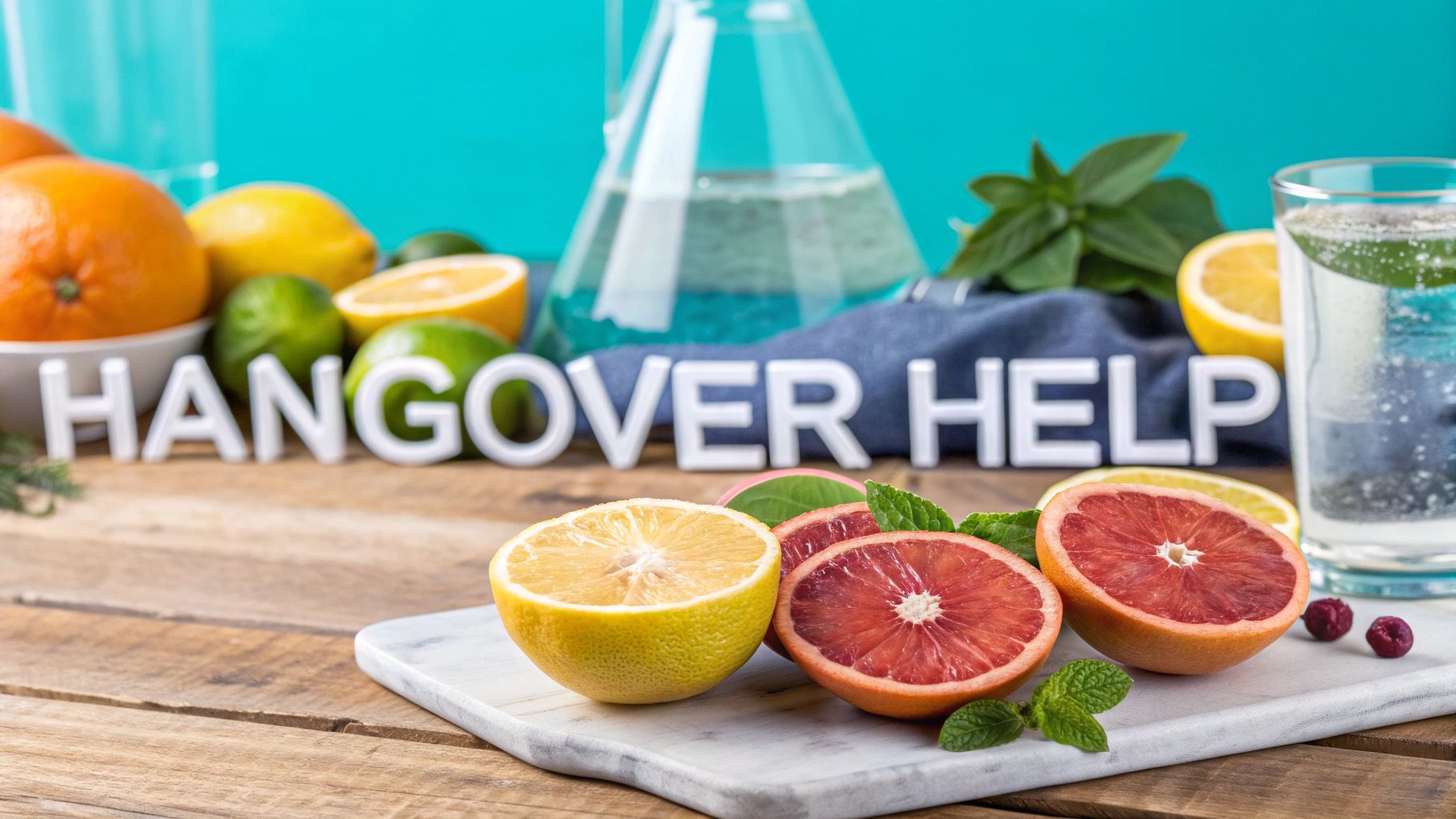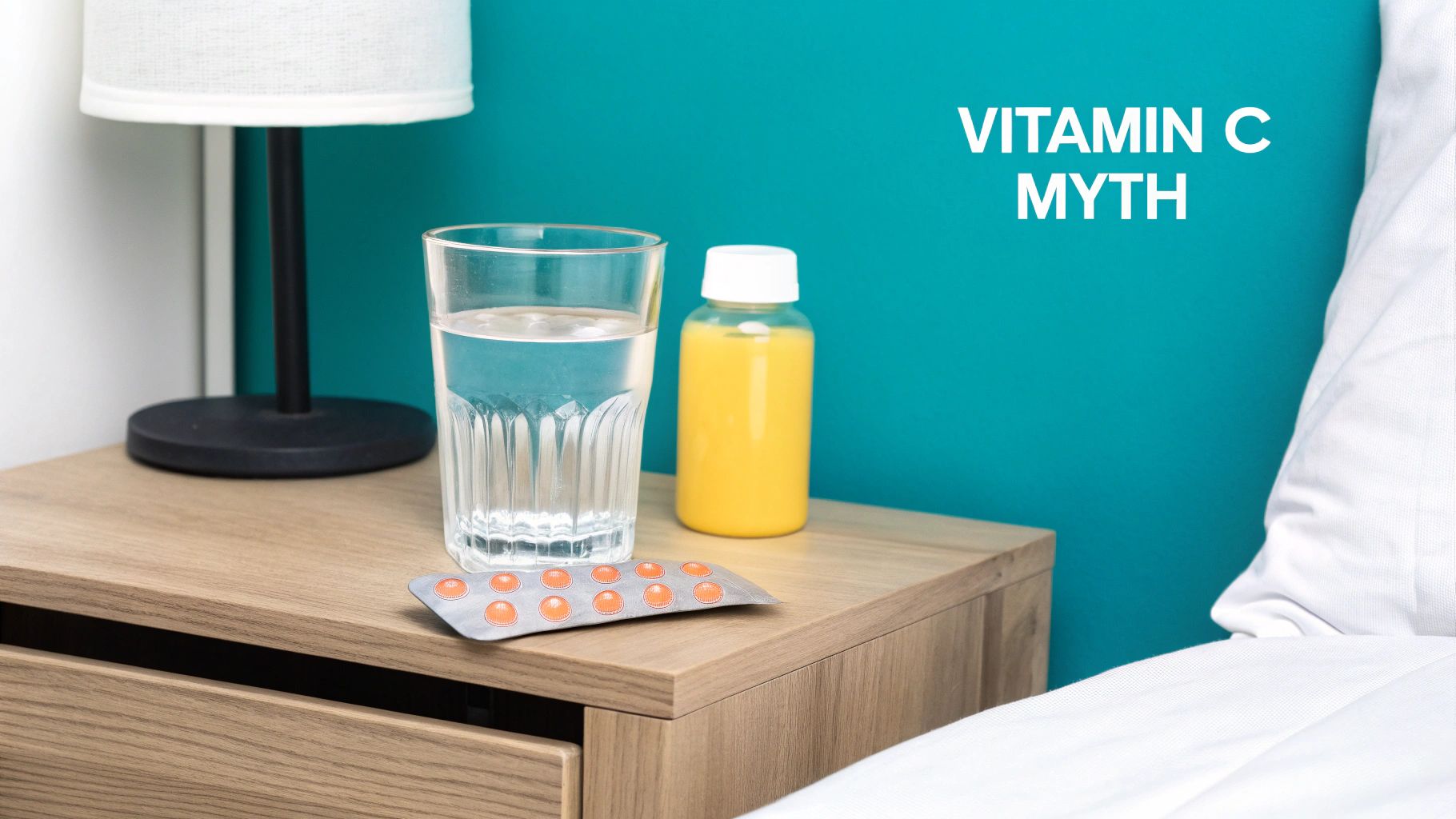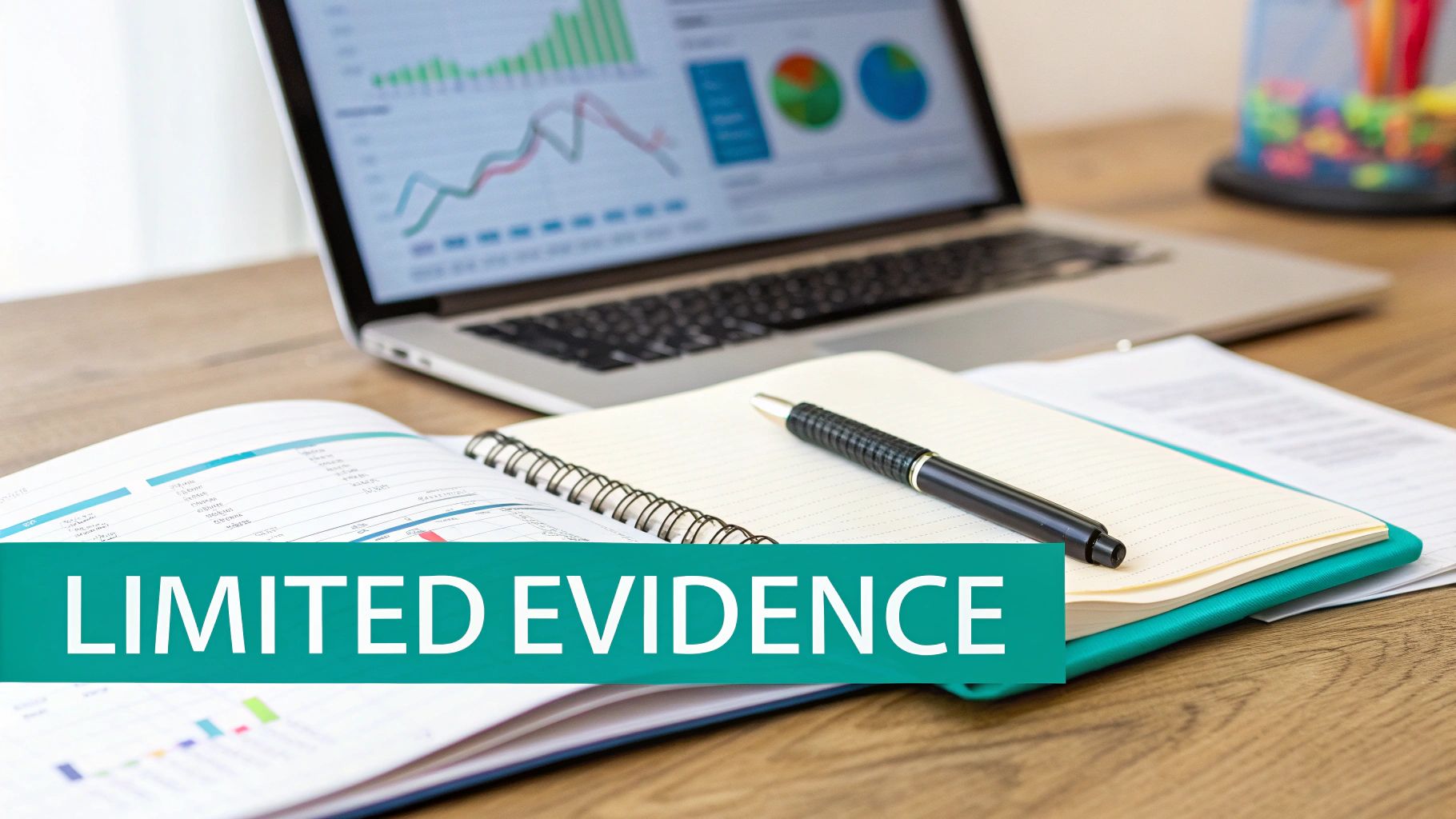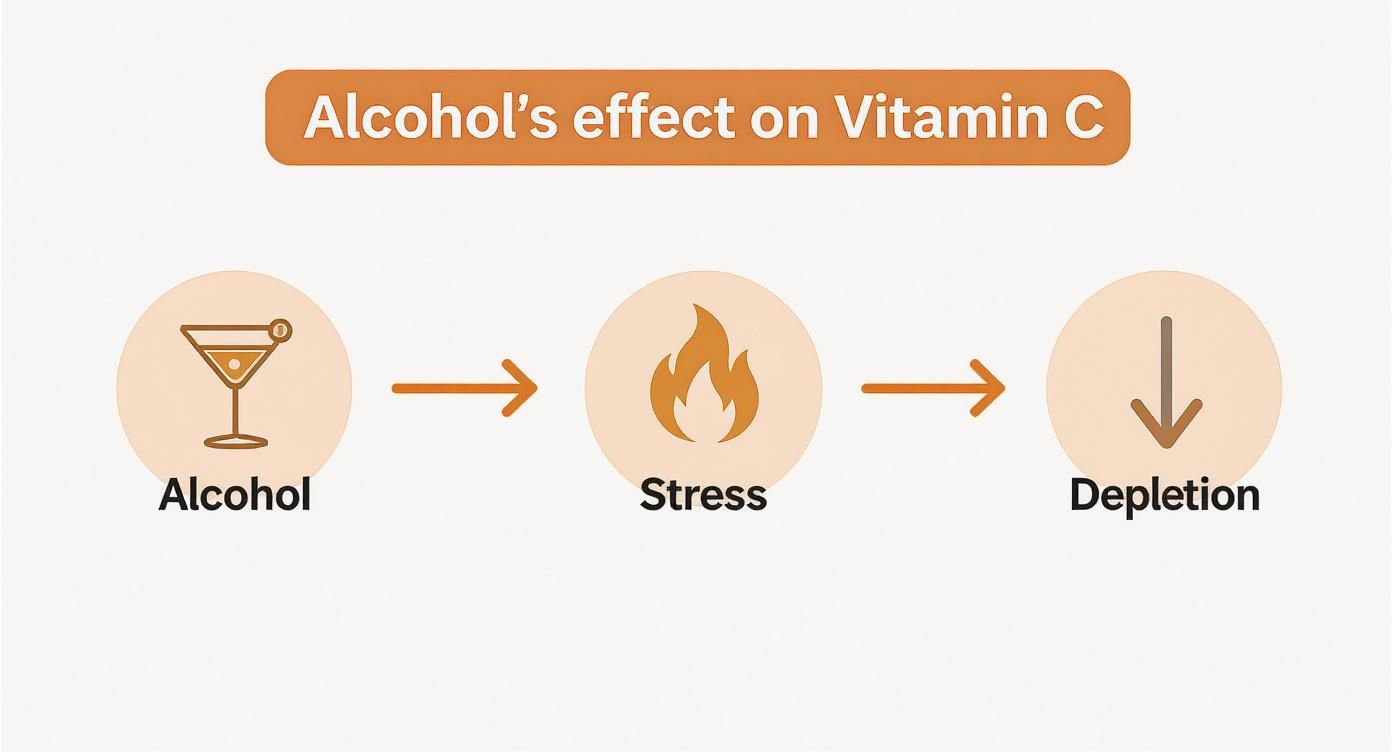

· By Annemarie
Vitamin C and Hangovers Can It Really Help
We've all been there. Reaching for a giant glass of orange juice after a long night, clinging to the hope that a blast of vitamin C will magically erase last night's bad decisions. It's an old trick, but is there any real truth to it?
The real story behind vitamin C and hangovers is a bit more complicated than just chugging some OJ and calling it a day. While it’s a powerhouse antioxidant, its direct hit on your hangover is probably not what you think.
What Causes a Hangover Anyway?

Before we can figure out if vitamin C is the hero we need, let's get real about what a hangover actually is. It’s not just one thing—it’s a full-on assault on your body. Think of it as a perfect storm of awful that leaves you feeling drained, sick, and mentally foggy.
The culprits behind that dreaded morning-after feeling are a mix of different problems, and each one plays its part in making you miserable. While scientists are still digging into the nitty-gritty, most agree it boils down to three major issues.
The Three Pillars of a Hangover
The reason you feel like you got hit by a bus is a nasty trio of problems that alcohol kicks off in your system. Getting a handle on these is the first step to actually finding a solution that works.
- Dehydration: Alcohol is a diuretic, which is a fancy way of saying it makes you pee... a lot. All that fluid loss leads straight to headaches, dizziness, and fatigue. Sound familiar?
- Inflammation: Your immune system doesn't love being flooded with alcohol, so it fires up an inflammatory response. This is what can make you feel generally unwell and unable to focus on anything.
- Oxidative Stress: As your liver works overtime to break down alcohol, it creates a bunch of toxic gunk and an army of damaging molecules called free radicals. This whole mess is called oxidative stress, and it damages your cells and fuels inflammation.
It's that last point—oxidative stress—where vitamin C enters the chat. As a famous antioxidant, its main job is to fight off those nasty free radicals. This is exactly why it became a go-to (but often misunderstood) hangover remedy.
The logic seems simple, right? Alcohol causes oxidative stress, vitamin C fights oxidative stress, so it must be a hangover cure. But a hangover is just too complex for one single nutrient to fix.
While topping up your vitamin C levels is always a good idea for your health, it doesn't do much for the other core problems, like being seriously dehydrated or dealing with that body-wide inflammation. Let's take an honest, science-backed look at what really helps and what's just wishful thinking.
What Scientific Research Actually Reveals

The idea linking vitamin C and hangovers seems pretty solid on the surface. We know that drinking alcohol kicks up a bunch of cell-damaging free radicals, and vitamin C is famous for being a top-tier antioxidant that shuts them down. So, it makes perfect sense that loading up on vitamin C would help, right?
Well, here's the thing. When you step away from the theory and look for hard proof, the evidence gets surprisingly thin. That popular belief? It hasn't quite held up to scientific scrutiny.
The Problem with Old Research
A lot of the initial buzz for vitamin C as a hangover helper came from older animal studies. For instance, some research on mice suggested that vitamin C could help the body process and clear out alcohol faster. While that sounds promising, there's a huge catch: what works for mice rarely works the same way for people.
Human metabolism is just a whole lot more complicated. Relying on decades-old animal research to plan your morning-after recovery is like using a dusty old map to navigate a modern city. You're probably not going to get where you want to go.
The real issue is the massive gap between a good theory and solid, repeatable human evidence. The scientific community just hasn't produced the kind of modern clinical trials that would confirm vitamin C actually makes a difference for hangover symptoms.
A Closer Look at Human Studies
When we dig into the human studies that do exist, the case for vitamin C gets even weaker.
Plenty of so-called hangover cures, including those trendy IV drips packed with vitamins, have been put to the test. One randomized controlled trial found that these pricey IV cocktails offered no significant benefit for hangovers compared to just, you know, drinking water.
After years of speculation, we're left with very little direct evidence that vitamin C can meaningfully take the edge off a hangover. A recent analysis of popular hangover products found no scientific proof from high-quality trials that any single vitamin—C included—reduces the severity of a hangover.
This lack of strong evidence is key. It tells us that while vitamin C is fantastic for our overall health, it’s not the targeted silver bullet for hangovers we hoped it would be. To really tackle the morning-after misery, you have to understand what causes hangovers in the first place. It’s a complex storm of dehydration, inflammation, and metabolic chaos, and simply tossing in one antioxidant isn't enough to calm it.
How Alcohol Affects Your Vitamin C Levels
When you have a few drinks, you're doing more than just racking up empty calories or messing with your sleep. You’re actually starting a battle inside your body, and one of the first casualties is your vitamin C. Understanding this is the key to figuring out why just popping a vitamin C tablet the next morning won’t magically erase a hangover.
Think of your body’s vitamin C supply like a team of highly-trained firefighters. Every time you drink, the process of breaking down that alcohol creates a massive fire of what’s called oxidative stress. Your antioxidant firefighters, with vitamin C leading the charge, rush in to put out those cellular flames. They neutralize nasty free radicals before they can cause real damage.
But this heroic effort comes at a cost. Your body burns through its vitamin C to handle the crisis, leaving your reserves totally depleted. The more you drink, the bigger the fire, and the more vitamin C is sacrificed just to keep things under control.
The Double Impact of Depletion
The problem actually hits you from two different directions. Not only does your body use up its vitamin C to fight off oxidative stress, but alcohol is also a diuretic. It makes you pee. A lot.
This constant flushing doesn't just lead to dehydration; it also kicks water-soluble vitamins, including vitamin C, right out of your system. You can get the full scoop on how alcohol messes with your body's fluid balance in our guide on how does alcohol dehydrate you.
And this isn't just a theory—science backs it up. One study showed that even a moderate amount of alcohol cranked up the urinary loss of vitamin C by a shocking 47%. So you're losing this crucial nutrient faster than ever, right when your body needs it most to deal with the internal chaos alcohol creates.
This is the part people miss. Getting your vitamin C levels back to normal is great for your overall health, and it helps replace what alcohol took. But restocking your "firefighters" after the fire is already out doesn’t fix the initial damage. It also doesn't touch the other big causes of a hangover, like inflammation and dehydration.
Setting Realistic Expectations
So while the link between vitamin C and hangovers is real, its role in providing immediate relief gets a little overhyped. Some older studies suggested that taking huge doses of vitamin C before drinking could help clear alcohol from your blood faster. But these studies used massive, impractical amounts and haven't held up in modern, large-scale research.
The bottom line from current science is this: while vitamin C is absolutely essential for your body's recovery process, it doesn't measurably reduce hangover symptoms for most people. For more on the data, you can check out these scientific findings on pmc.ncbi.nlm.nih.gov.
Why Vitamin C Is a Hangover Product Staple
So, if the science linking vitamin c and hangovers is so thin, why is it in practically every hangover remedy you see? It comes down to some really smart marketing and understanding how we think as consumers, rather than any proven hangover-crushing power.
Vitamin C just has a powerful "health halo" around it. We all grew up associating it with a strong immune system and fighting off colds. When companies put it in a product, it instantly makes the whole thing feel healthier and more legitimate. It’s a familiar, trusted ingredient that just screams "wellness," making it an easy sell when you're desperate for some morning-after help.
The Power of Proprietary Blends
You'll rarely see vitamin C as the main event in these supplements. Instead, it’s usually tucked into a proprietary blend with a bunch of other well-known ingredients like B-vitamins, electrolytes, and different herbal extracts. This is a clever strategy because it makes it almost impossible for you to know what ingredient is actually doing anything.
By bundling everything together, companies create a formula that looks complex and impressive. Vitamin C plays a great supporting role, lending its good reputation to the entire product while the other ingredients are supposed to be doing the heavy lifting.
This infographic breaks down how a night of drinking can directly lead to oxidative stress, which in turn drains your body's vitamin C supply.

As you can see, alcohol really does act as a major stressor on the body, leading to a direct drop in this crucial antioxidant.
Perception Trumps Proof
At the end of the day, vitamin C's spot in hangover products is mostly about its great safety record and market demand, not its proven ability to fight hangovers. For supplement makers, it's a low-risk ingredient with a high-reward reputation.
The market for hangover cures is flooded with products that highlight vitamin C, but this popularity just doesn't line up with the clinical facts. When researchers analyzed these products, they found that while vitamins are common, there's no solid science to back up their use for hangovers. Even medical authorities are clear: there's no real evidence vitamin C helps. Its continued presence just shows that what we think works often wins out over what's been proven. You can dig into more of the research on popular hangover remedy ingredients on journals.sagepub.com.
The takeaway is simple: just because an ingredient is well-known and safe doesn't mean it's effective for a specific problem. Being a savvy consumer means looking past the health halo and focusing on what the evidence actually supports.
Smarter Ways to Support Post-Drinking Recovery
While the whole vitamin c and hangovers connection is mostly a myth, the desire for a better morning after is definitely real. The secret isn't some single "magic" ingredient, but a smarter, more complete game plan that actually targets the root causes of your misery. Trust me, focusing on proven strategies will do a whole lot more for you than a glass of orange juice.
True recovery starts by tackling the hangover's core issues head-on. That means shifting your focus from one antioxidant to a multi-pronged approach that supports your body's entire system.
The Foundations of a Better Morning
Before you even think about reaching for a supplement, let's get back to basics. These three pillars of post-drinking care are absolutely non-negotiable if you want to feel human again.
- Aggressive Hydration: Alcohol is a diuretic, which is just a fancy way of saying it makes you pee out water and essential electrolytes. Chugging plain water is a start, but adding electrolytes like sodium, potassium, and magnesium is crucial for getting your body's fluid balance back on track and kicking those headaches and fatigue to the curb.
- A Balanced Meal: Seriously, drinking on an empty stomach is just a recipe for disaster. Eating a solid meal with carbs, protein, and healthy fats before you start drinking slows down alcohol absorption and keeps your blood sugar from going on a rollercoaster, preventing that awful next-day crash.
- Prioritize Sleep: Alcohol completely messes with your sleep cycle, robbing you of the deep, restorative rest your brain and body desperately need. It might knock you out, but the quality of that sleep is terrible. Aim for as much uninterrupted rest as you can get to let your body repair itself.
Introducing a More Targeted Solution
This is exactly where something like Upside comes into play. Instead of banking on a single nutrient with a shaky scientific track record, Upside is built to provide support against the multiple causes of a hangover. It’s not about one ingredient; it’s about a whole team of them working together.
Upside's formula is designed to give your body what it actually needs. We're talking powerful, science-backed ingredients that go way beyond what a simple vitamin can offer.
An effective recovery plan has to acknowledge that a hangover is a complex problem. You need a solution that can address dehydration, support your liver, and help calm your body's inflammatory response all at once.
Why Upside's Ingredients Make a Difference
The real strength of Upside is in its formula, which is packed with compounds specifically chosen for their roles in helping you bounce back after a night out.
- Dihydromyricetin (DHM): This herbal extract has been studied for its ability to support the liver's natural detox process. In short, it helps your body break down alcohol and its nasty byproducts more efficiently.
- Milk Thistle: A classic herb for a reason, milk thistle brings antioxidant and anti-inflammatory properties to the table, specifically supporting liver health—which is basically ground zero for alcohol processing.
- Essential Electrolytes: Upside gets to work replenishing the critical minerals you lost while drinking, directly tackling the dehydration that fuels headaches and weakness.
By combining these targeted ingredients, Upside gives you a much more direct and effective path to recovery than just hoping a glass of OJ will do the trick. If you want to get a better sense of which nutrients truly matter for bouncing back, check out our guide on the essential vitamins to take for hangover relief. At the end of the day, smarter recovery means choosing a strategy that’s actually backed by science.
Common Questions About Vitamin C and Hangovers
Even when you know the science, it's easy to get tangled up in the persistent myths around vitamin C and hangovers. Let's clear the air and tackle the most common questions head-on. No fluff, just straight answers so you can make smarter choices for your morning-after recovery.
Think of this as your final myth-busting session, locking in what you've learned so you're running on evidence, not old wives' tales.
Will Taking Vitamin C Before Drinking Prevent a Hangover?
This is probably the most popular theory out there, but unfortunately, there’s no solid science to back it up. The logic seems sound—load up on antioxidants to prep your body for the oxidative stress from alcohol.
A few ancient, small-scale studies hinted that massive doses might help clear alcohol from your system a tiny bit faster. But those findings have never been repeated in modern, high-quality human studies. Frankly, banking on this strategy is a gamble you're almost certain to lose.
Key Takeaway: Being proactive is great, but put your energy where it counts. The best ways to prevent a nasty hangover are still the classics: drink in moderation, sip water and electrolytes all night, and never, ever drink on an empty stomach.
A real meal will always do more to slow alcohol absorption than a vitamin C tablet ever could.
Is There Any Harm in Taking Vitamin C for a Hangover?
For most of us, taking a normal dose of vitamin C when you’re hungover is perfectly safe. It’s a water-soluble vitamin, which means your body just gets rid of what it doesn’t use.
The catch? Mega-dosing. If you take way, way more than the recommended amount, you could end up with an upset stomach or diarrhea. That’s the absolute last thing you need when you're already feeling green.
The real "harm," though, isn't about physical danger—it's about a flawed strategy. When you put all your faith in a remedy that doesn't really work, you're probably ignoring the stuff that does. It's all about managing your expectations. Focusing on rest, rehydration, and electrolytes is a much better use of your precious recovery time.
Why Does My Friend Swear Vitamin C Cures Their Hangovers?
The power of belief is a funny thing. What your friend is likely experiencing is the good old placebo effect. If you truly believe something is going to make you feel better, your brain can actually trigger a real, if temporary, improvement in your symptoms.
But there's more to it. Think about how they're taking that vitamin C. They’re probably washing it down with a giant glass of orange juice or water.
- Hydration is the real hero. That big glass of liquid is doing most of the heavy lifting, fighting the dehydration that’s causing their headache and fatigue.
- It feels proactive. Just doing something to feel better can give you a psychological boost. The simple act of "treating" your hangover can feel restorative all on its own.
So while your friend might genuinely feel better, it's almost certain that the hydration and the placebo effect are the real stars of the show, not the vitamin itself.
What Is a Better Alternative for Hangover Support?
A far better approach is one that attacks the hangover from all sides. A hangover isn't just one problem, so a single-ingredient "fix" is bound to fall short. You need a game plan.
That means using a formula that targets the multiple causes of your misery:
- Rehydration: It's not just about water. You need to replenish critical electrolytes like sodium and potassium that alcohol flushes out.
- Liver Support: Give your liver a helping hand as it works overtime to process alcohol and its toxic byproducts.
- Reducing Inflammation: Alcohol triggers an immune response that can leave you feeling sick and achy. Calming that inflammation is key.
This is exactly why something like Upside Hangover Sticks is a smarter choice. It’s built with ingredients like Dihydromyricetin (DHM) and milk thistle to support your liver, plus a full lineup of electrolytes to get you rehydrated fast. It's a targeted, science-backed approach that offers way more support than a simple vitamin ever could.
Ready to stop relying on myths and start using a science-backed solution for smarter, more enjoyable nights out? Upside offers a comprehensive formula designed to help you feel your best the morning after. Try Upside Hangover Sticks and experience the difference for yourself. Find your new go-to recovery partner at enjoyupside.com.
#upside #enjoyupside #upsidejelly #livemore #hangovercure #hangoverprevention #fighthangovers #preventhangovers #HangoverRelief #MorningAfter #PartySmarter #HydrationStation #WellnessVibes #RecoverFaster #NoMoreHangovers #HealthyParty #HangoverHacks #FeelGoodMorning #NightlifeEssentials #HangoverFree #SupplementGoals #PostPartyPrep #GoodVibesOnly #HealthAndParty #HangoverHelper #UpsideToPartying
